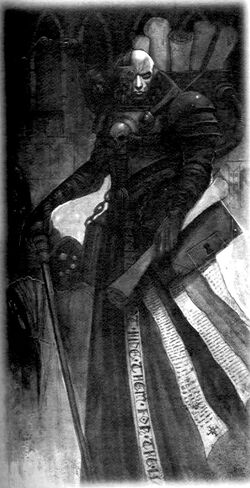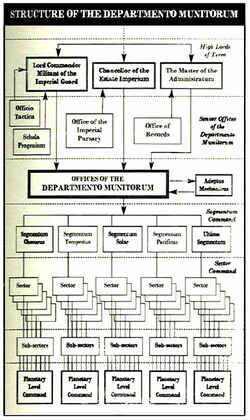The Departmento Munitorum, also called the Adeptus Munitorum, is a department or sub-division of the Adeptus Administratum devoted to the general administration, personnel assignment, supply and logistics of the Imperial Guard. The Munitorum has ultimate responsibility for the raising of new Imperial Guard regiments, the training of new Imperial Guard troops, the provision of equipment and supplies to all regiments in the field, and the transportation of troops and equipment to and from theatres of war using the vessels of the Imperial Navy. It is primarily a logistical organisation, like the larger Administratum of which it is a part, but while the Administratum deals with the civilian logistics of running the entire Imperium of Man, the Munitorum deals solely with the military logistics necessary to fight and win the Imperium's wars on behalf of all branches of the Imperial armed forces.
History

An ancient bas relief of the Departmento Munitorum supporting the Imperial Army
The Departmento Munitorum was founded in the early years of the 31st Millennium during the Great Crusade to help provide strategic command for the Imperial Army. The structure of the Imperium at that time was very different to what it is like in the late 41st Millennium. In the earliest days of the Great Crusade in the late 30th Millennium, all that was required of the fighting forces of the Imperium was conquest. The Imperial Expeditionary Fleets that set out from Terra only carried with them the means to fulfill a portion of their supply needs, and simply took what they needed from the worlds they conquered in their travels. Upon the completion of a successful Imperial Compliance action on a world, the Expeditionary Fleet would move on, leaving the assimilation of the planet into the Imperial fold to fleets of pioneers and Terran colonists. Each world, in time, would become fully capable of supporting itself and contributing to the needs of the growing number of Imperial Expeditionary Fleets.
Such a state of affairs could not continue, for eventually each fleet would exhaust its supplies and be too far from a Compliant world capable of resupply. In these times, the resources necessary to fight a campaign were organised by the commanding officer of each individual Expeditionary Fleet, a necessity of the times, but one that was wholly unsuited to the growing size and complexity of the Imperium. The newly formed Council of Terra began recruiting those individuals whose minds could function in a number of specialties: as war leader, diplomat, exactor, mediator and logistician. Such able-bodied men and women suited to the task of stellar logistics were few and far between and the Council empowered these administrators with the duty of maintaining the Emperor's armies in perpetuity. This earliest incarnation of the Munitorum was known as the Corps Logisticae for a while, then a division within the naval administration, then was briefly overseen by the superb logistical brilliance of Malcador the Sigillite and his appointed subordinates. Only shortly prior to the Primarch Horus' appointment as Imperial Warmaster following the victory in the Ullanor Crusade had the Corps Logisticae grown into a full Departmento, with all the bureaucratic advantages that it brought them. But initially some mistakes had been made, such as confusion over planetary coordinates and non-standard equipment reaching the Space Marine Legions.

Departmento Munitorum Logistician
The earliest pioneers in organising a unified Imperial supply and recruitment structure had almost insurmountable obstacles to overcome, not least of which was the reluctance of each Imperial Expedition's corps of officers, most of them Space Marines, to relinquish control of such things to mere mortals, even when they were more qualified to administer them than Astartes. As the Imperium continued to expand across the galaxy from Terra and the scale of conquered space became relatively manageable, such resistance to change was understandable, if short-sighted. As time passed and the demands of a constantly changing battlefield required greater and greater ingenuity on the part of the Imperial war machine, Imperial Army soldiers would often go into battle equipped with a multitude of different weapons, ammunition stocks, armour and training. Rumours persist that there were darker reasons for it being desirable that no Imperial force could look to its own supply in these times, but evidence of such motivations cannot be substantiated.
The very success of the earliest Expeditionary Fleets were to sound the death knell for such objections, for soon the Imperium had become so large that such resistance to more centralised logistics and bureaucracy became untenable. Central control of the Imperial forces (primarily the Imperial Army) was given to the newly-named Departmento Munitorum shortly before the start of the Horus Heresy. From this point onwards, every Imperial Army regiment (and after the Heresy, every Imperial Guard regiment) would look to the Departmento Munitorum to raise, supply, train and dispatch it. In recognition of the great importance of this work, no less than three seats amongst the lords of the Council of Terra were given to the most senior officers of the Departmento Munitorum: the Lord Commander Militant of the Imperial Army, the Lord Commander of the Estate Imperium and the Master of the Administratum.
Role
The Departmento Munitorum continues to maintain the ultimate responsibility for the raising of new Imperial Guard regiments, the training of new Imperial Army troops, the provision of equipment and supplies to all regiments in the field, and the transportation of troops and equipment to and from theatres of war using the vessels of the Imperial Navy. It is primarily a logistical organisation, like the larger Administratum of which it is a part, but while the Administratum deals with the civilian logistics of running the entire Imperium of Man, the Munitorum deals solely with the military logistics necessary to fight and win the Imperium's wars on behalf of all branches of the Imperial armed forces. The Munitorum is financed by tithes of men, money and materiel drawn from the Imperium's myriad worlds, and all Imperial planets able to support the Imperial military forces in a sector are regularly called on to do so. To make sure the tithes are provided as and when required, bureaucrats of the Departmento Munitorum are present on almost every Imperial planet as part of its branch of the local Administratum. Representatives of the organisation are also present on all Imperial Navy starships, and wherever Imperial Guard forces are stationed.
Organisation
"There is no right or wrong in our profession. The present changes the past from moment to moment. Only pray for the future to vindicate your actions."
- — Litany of the Adepts, Canticle of the Administrator

Organisational Chart of the Departmento Munitorum
The Departmento Munitorum is organised to allow each relevant level of the Adeptus Terra to respond effectively to the myriad threats that confront the people of the Imperium, regardless of their size and location in the galaxy. The local divisions of the Departmento can raise tithes from worlds close to a war zone without needing a response from the higher levels of the Munitorum's bureaucracy. As the level of a threat increases and more local departments of the Munitorum become involved, the amount tithed, and the amount of planets tithed from, increases. At this point, higher levels of the Departmento Munitorum will also become involved, and may funnel additional resources from other parts of the Imperium into a given war zone. The local Adepts of the Departmento Munitorum in an Imperial sub-sector have the legal authority to impose instant tithes, without forewarning, as and when required. Because of this, true central command over the Imperial Guard's logistics from Terra is not needed or even advantageous, due to the functional autonomy of each level of the organisation. The Departmento Munitorum does not handle logistics for the Adeptus Astartes or for the Adepta Sororitas' Orders Militant, as each Space Marine Chapter is a fully self-contained military organisation and the Sisters of Battle depend on the Ecclesiarchy to serve their administrative and logistical needs.
Command
The Departmento Munitorum is effectively represented among the Imperium's rulers by three members of the High Lords of Terra and is ultimately required to answer to the demands of all three, including:
- Lord Commander Militant of the Imperial Guard
- Chancellor of the Estate Imperium
- Master of the Administratum
Senior Offices
The Departmento Munitorum consists of four Senior Offices, each of which answers to one of its three directors:
- Officio Tactica - Subordinate to the Lord Commander Militant, this office seeks to determine the logistical needs required for every active Imperial war zone.
- Office of the Imperial Pursary - Subordinate to the Chancellor of the Estate Imperium, this office seeks to maintain a record of all the funds and materiel taken in tithes by the Munitorum and all funds expended by the Departmento to meet the demands laid out by the Officio Tactica. The bureaucrats in this office essentially serve as the paymasters of the Imperial armed forces.
- Office of Records - Surbordinate to the Master of the Administratum, this office is responsible for creating and maintaining all of the Munitorum's records, some of which can go back for more than ten thousand standard years.
- Schola Progenium - The Schola Progenium are coordinated and ran under the auspices of the Adeptus Ministorum, even though their charges' destinies are usually determined by the Munitorum once they come of age. The Schola Progenium are primarily responsible for the upbringing and training of orphans, predominantly those of Imperial Guard and Navy officers who have died in the service of the Imperium. Many go on to become Commissars, high-ranking Imperial officers, members of the Adepta Sororitas, or even servants of the Inquisition.
Offices Minoris
Below the Senior Offices are a vast multitude of lower Offices which are charged with overseeing different aspects of the Imperial armed forces' logistics and preparedness. Many of these offices coordinate their activities with the Adeptus Mechanicus.
- Administratum Assay Corps - This division of the Munitorum is responsible for ensuring the efficiency and incorruptibility of the Munitorum's bureaucracy where it interfaces with that of the larger Administratum. They represent the bureaucracy that other bureaucrats must contend with to get their own jobs done.
- Commissariat - The Commissariat is responsible for the recruitment, training and overseeing the activities of its corps of Commissars.
- Engineer Corps - The Munitorum Engineers Corps often works in close concert with the Mechanicus and is responsible for all military enginnering projects that are not conducted while under fire at the frontlines.
- Field Enforcement Corps - The Field Enforcement Corps enforces all Munitorum and Imperial regulations on the Departmento's personnel. They are particularly concerned with prevention corruption by Munitorum bureaucrats.
- Labour Corps - The Labour Corps often works in concert with the Mechanicus and the Engineer Corps in constructing bases, airfields, research facilities, orbital docks, space stations and any other facilities required by the Imperial armed forces. The Labour Corps' personnel is composed largely of indentured labour, penal labour and Servitors.
- Pioneer Corps - The Pioneer Corps is the division of the Munitorum that often scouts and prepares planets to serve as new Imperial military bases, preparing the way for the arrival of the Engineer Corps and the Labour Corps.
- Siege Auxillia Corps - The Siege Auxillia Corps is the division of the Munitorum that aids Imperial military forces in warehousing, transporting, constructing and maintaining the equipment needed for long-duration planetary and urban sieges.
Sources
- Codex: Armageddon (3rd Edition), pg. 32
- Codex: Eye of Terror (3rd Edition), pg. 16
- Codex: Imperial Guard (5th Edition), pg. 7
- Codex: Imperial Guard (3rd Edition, 2nd Codex), pg. 9
- Codex: Imperial Guard (2nd Edition), pp. 8-9
- Dark Heresy: Core Rulebook (RPG), pg. 68
- Deathwatch: Core Rulebook (RPG), pp. 331-349
- Imperial Infantryman's Uplifting Primer (Background Book)
- Imperial Munitorum Manual (Background Book), pg. 11
- Tactica Imperialis (Background Book)
- Brotherhood of the Storm (Novella) by Chris Wraight
